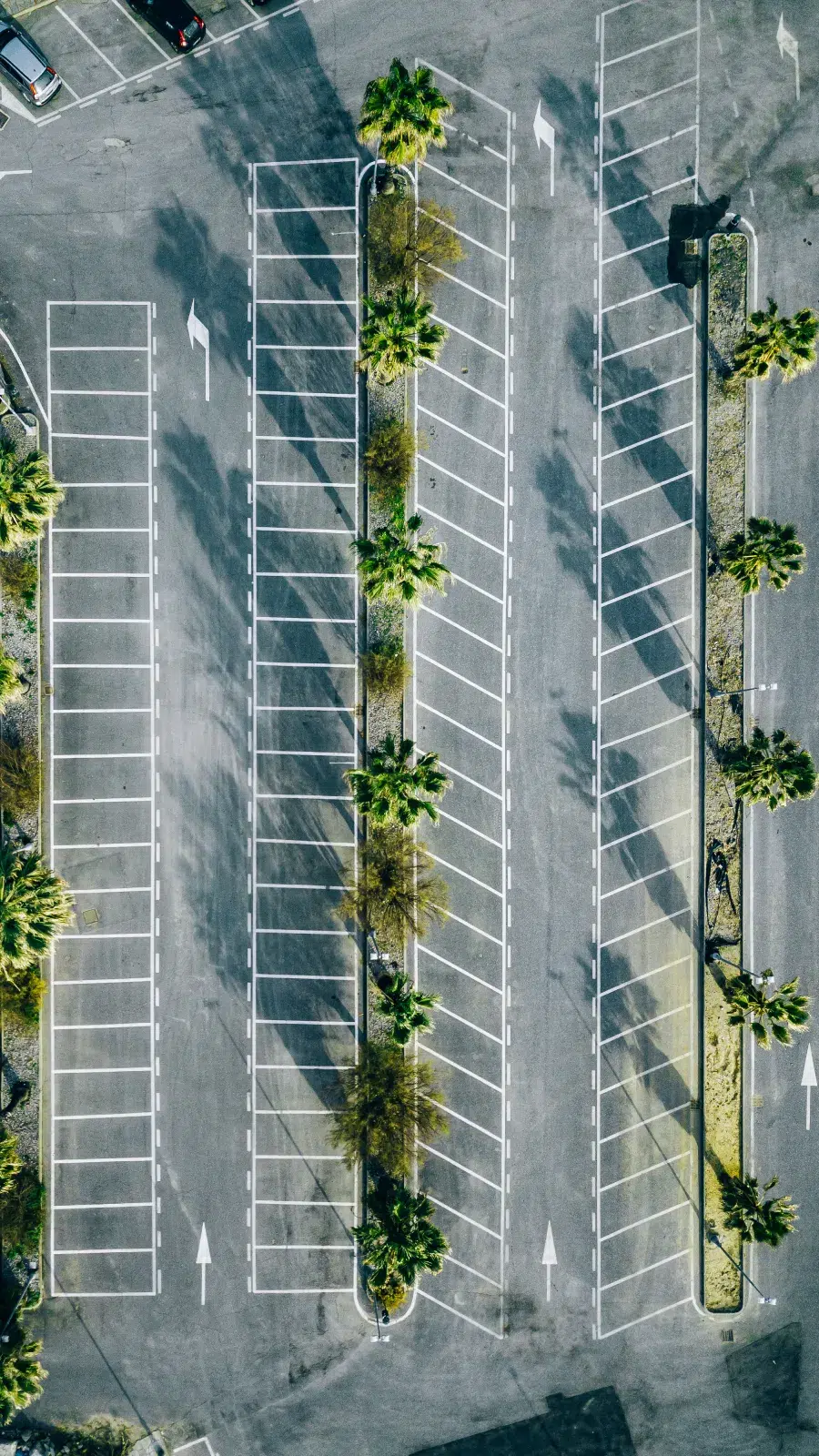Parking Lot Liability Guide
Parking lot accidents can be incredibly complex, often involving unclear liability. If you have been injured in a parking incident, you may be unsure of your next steps. This guide explains how liability is determined in parking lot accidents and how it affects claims. For more information and to get started with your case, call Rob Levine Law at (888) 791-9135.
Table of Contents
- What Types of Accidents Commonly Occur in Parking Lots?
- What Is Parking Lot Liability?
- Who Can Be Held Liable for Parking Lot Accidents?
- Common Causes of Parking Lot Accidents and How They Impact Liability
- How Is Fault Determined in Parking Lot Accidents?
- Premises Liability in Parking Lots: The Duty of Care
- What Are a Property Owner’s Legal Responsibilities for Parking Lot Safety?
- Can a Business Be Sued for Poor Parking Lot Maintenance?
- Can You File a Claim if You Did Not Report the Incident Immediately?
- Does Auto Insurance Typically Cover Parking Lot Accidents?
- Challenges in Parking Lot Liability Cases
- Where Can You Find More Information About Parking Lot Liability?
What Types of Accidents Commonly Occur in Parking Lots?
Several different types of incidents can and often do occur in parking lots, including the following:
- Slip and Fall Accidents: Slipping in a parking lot is relatively common, especially during winter when ice and sleet may build up.
- Car Collisions: Parking lots are constantly busy with cars maneuvering in and out of spots, increasing the risk of two or more vehicles colliding.
- Pedestrian Accidents: Mixing foot traffic with automobiles can significantly increase the likelihood of a pedestrian accident.
- Assaults and Other Crimes: A parking lot with inadequate security measures can enable criminal activity.
- Collisions with Fixed Objects: Unlike the open road, parking lots have numerous barriers, signs, and curbs that can be collided with.
- Vehicle Damage: A car, truck, or motorcycle could sustain damage in incidents other than auto collisions, including defective pavement, open potholes, and fallen tree branches.
- Bicycle Accidents: Cyclists must always stay aware of their surroundings and watch out for drivers who may not be paying attention.
What Is Parking Lot Liability?
Liability for a parking lot accident depends on the nature of the incident. Many cases are based on the theory of premises liability, which holds the owners or possessors of properties responsible for injuries caused by unsafe conditions on their premises.
A property owner or manager can be held liable if a visitor to their parking lot is harmed due to the following:
- Physical hazards
- Defects in the infrastructure
- Insufficient lighting
- Poor signage
- Lack of security
In addition, a negligent driver may be responsible. Car accidents at parking lots generally result from distracted driving, failing to yield, speeding, improper turns, aggressive driving, and failing to keep a proper lookout for other vehicles and pedestrians.
However, to prove that a property owner or driver was negligent, you must present evidence of the following four elements:
- Duty of Care: The defendant owed a duty of reasonable care.
- Breach of Duty: The defendant breached that duty through their negligence.
- Causation: The breach directly caused the accident and harm to the plaintiff.
- Damages: The plaintiff suffered compensable damages.
As an example of negligence, suppose a parking lot owner knew about and failed to address a large crack in the pavement. If a cyclist crashes because of the crack and is thrown from their bike, resulting in serious injuries, the property owner may be held liable.
Who Can Be Held Liable for Parking Lot Accidents?
Parties that could be held responsible for your injuries from a parking lot accident include the following:

Drivers Involved in the Accident
Drivers Involved in the Accident
If a driver failed to yield, drove while distracted, improperly reversed, or was otherwise negligent, you could hold them liable for your injuries resulting from an accident. In states with comparative negligence laws, like Massachusetts, you can recover compensation even if you are partially at fault for your injuries, so long as your share of the fault does not exceed 50%. However, your compensation would be reduced by your share of the fault.
Property Owners and Businesses
Property owners and businesses have a duty to keep their premises reasonably free from hazards for visitors. They may be held liable in a premises liability claim for injuries caused by hazardous conditions like potholes, poor lighting, inadequate security, and unclear signage.

Property Owners and Businesses

Maintenance Companies and Contractors
Maintenance Companies and Contractors
When third-party companies are responsible for the upkeep of a property and fail in their duties, this can give rise to hazardous conditions. If you can show evidence that poor maintenance and property neglect led to your injuries, you may be able to hold the company or contractor accountable.
Municipalities
Public parking lot accidents can be much more complicated than private property cases due to the involvement of a government entity. Attempting to sue a government entity is challenging due to sovereign immunity.
Before suing, you must file a written presentment, or notice, of the claim with the appropriate government agency within two years of the injury. In addition, some states, including Massachusetts, impose limited duties on public entities to maintain public ways, including some parking lots owned or maintained by municipalities or the state.

Municipalities
Common Causes of Parking Lot Accidents and How They Impact Liability
You must determine the cause of a parking lot accident to identify the at-fault party, establish liability, and prove the elements of negligence involved. Common causes of parking lot accidents include the following:
- Distracted or careless drivers
- Poor lighting or lack of signage
- Inadequate security and supervision
- Potholes, uneven or slippery surfaces, and other trip hazards
How Is Fault Determined in Parking Lot Accidents?
To establish liability, you must present evidence supporting your claims, such as the following:
- Surveillance footage, when available
- Witness testimony
- Incident reports from property management
- Police involvement, rare but possible
- Opinions from expert witnesses, such as accident reconstruction specialists
Fault is often shared, making these cases fact-specific. Our seasoned personal injury attorneys will conduct an in-depth investigation into your case and identify the liable parties.
Premises Liability in Parking Lots: The Duty of Care
Parking lot owners and businesses have a duty of care to maintain their property and prevent harm to visitors on their premises. These responsibilities include routine inspections, fixing hazards, ensuring adequate lighting, and clear traffic markings. Failure to meet these responsibilities can result in premises liability claims.
Parking Lot Slip and Fall Incidents: Liability Considerations
The most common slip and fall hazards include ice, oil spills, and uneven surfaces. Even though many of these hazards are not caused by the property owner, they still must take reasonable steps to mitigate or remove them. Liability in these cases often depends on whether the owner knew or should have known of the hazardous condition.
When an injury results from one of these hazards, maintenance logs, business records, and warning signage might help prove liability.
What Are a Property Owner’s Legal Responsibilities for Parking Lot Safety?
There are specific actions and precautions property owners should take to fulfill their duty of care and prevent accidents, including the following:
- Regular Inspection & Maintenance
- Adequate Lighting
- Clear Signage & Markings
- Pedestrian Safety Measures
- Traffic Flow Control
- Security Measures
- Prompt Hazard Response
- Compliance with Local Regulations
Can a Business Be Sued for Poor Parking Lot Maintenance?
The specific details of a case will determine whether a business tenant or property owner should be held responsible for the accident. However, multiple parties might share liability for accidents in commercial settings involving leased property, like retail stores, restaurants, office buildings, shopping centers, and strip malls.
Liability typically depends on who had actual control over the area where the injury occurred. For example, if a shopper trips on uneven pavement in front of a store entrance, and the tenant controls this area under the lease, they may be solely liable. If the landlord still retains partial responsibility for the storefront’s surroundings, both entities may be liable.
These cases often depend on maintenance agreements, control over the property, and whether the hazard was foreseeable. Our attorneys can guide your claim from start to finish and ensure that the correct party is held accountable for covering your damages.
Can You File a Claim if You Did Not Report the Incident Immediately?
Delayed reporting does not automatically bar someone from making a claim. However, providing prompt notice of the accident can significantly strengthen a claim. It’s important to act while the evidence is still fresh.
Even if you did not take immediate action after a parking lot accident, you can still preserve your rights to compensation by following up on medical care and collecting any available evidence, like medical records and photographs of the accident scene.
Does Auto Insurance Typically Cover Parking Lot Accidents?
Most auto insurance policies cover parking lot accidents involving vehicles, depending on the available coverage. For instance, collision coverage pays for damage to your own vehicle when you are involved in a wreck, regardless of who caused it. Meanwhile, comprehensive coverage covers non-collision incidents such as theft, vandalism, weather damage, or damage from falling objects while your car is parked.
If you have personal injury protection or medical payment coverage, it will cover your medical expenses from a car accident. You might also be able to file a claim under an at-fault driver’s liability coverage if they caused an accident. If an at-fault driver does not have insurance or leaves the scene, uninsured motorist coverage may apply.
Automobile insurance will not cover your injury if your accident does not involve a vehicle. However, if the parking lot owner or another party is responsible for a premises liability claim, you can likely pursue a claim under their property insurance policy.

What Is Comprehensive Coverage?
Challenges in Parking Lot Liability Cases
Parking lot accidents typically involve premises liability or automobile accident law and pose complex challenges, such as the following:
- Lack of official police reports for minor incidents
- Difficulty in proving fault without surveillance or witnesses
- Disputes over whether the accident was foreseeable and preventable
You need strong evidence to support your claim. However, evidence disappears quickly, and witness memories fade. Thus, acting as quickly as possible to gather evidence while it is still fresh gives you the best shot at recovering the compensation you deserve.
Where Can You Find More Information About Parking Lot Liability?
Liability laws governing parking lot accidents are complex and vary from state to state. While this guide provides general information, the team at Rob Levine Law can offer sound legal guidance tailored to your specific situation.
To learn more about parking lot liability and how it applies to your case, speak with our experienced parking lot accident lawyers today. Call (888) 791-9135 or contact us online to schedule a free consultation.
